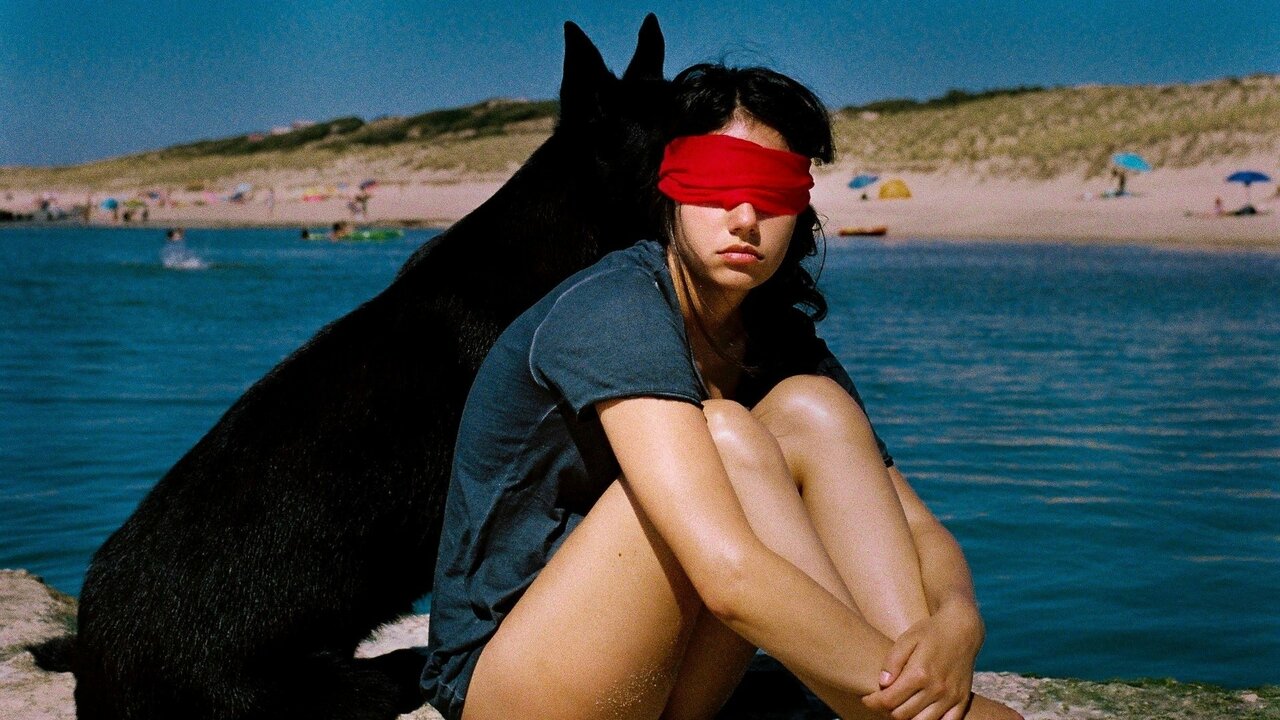In Léa Mysius' debut Ava, light and dark exist side-by-side. After an opening tableau that locates us squarely in a French coastal resort at high season among bronzed holidaymakers surfing a vibe of unlimited pleasure, we're introduced to the eponymous teenager (Noée Abita), who proves a far less sunny subject - in part due to a diagnosis of retinitis pigmentosa that has left her facing up to a marked reduction in her field of vision. With only sporadic attention coming her way from an overstretched single mother who spends her leisure time picking up younger men at the beach, Ava elects to run off with a massive black dog, very nearly twice her size, stolen from a brooding, raven-haired Romany lad whom the local police are threatening with deportation. The theme would appear to be set: darkness closing in on already moody adolescents. Ava daubs her bedroom walls with black paint, and takes to wearing a blindfold to prepare herself for what lies ahead of her; and Mysius wouldn't be the first creative to send for a black dog as a menacing metaphor for depression.
Still, this protean writer-director appears far more interested in those lively weirdnesses that lie at the edge of her young heroine's vision: a collapsed observation bunker at the end of the beach, its shadowy crevices providing ample opportunity for exploration; a bad dream in which Mysius very nearly matches Raw's Julia Ducournau for bracing imagery. The film is all sudden lurches and ruptures, which you could argue makes it broadly analogous to one's formative years; one of its strengths is that we never know how it, or its heroine, is likely to turn out. For some time, I suspected Mysius of having had the reasonably bright idea of relocating the coming-of-age upheavals of Andrea Arnold's Fish Tank to balmier climes. The minute you spot it, the more of a remake it starts to seem: the lopsided, three-girl family dynamic, the consolatory relationship between the girl and the animal, the deployment of the travelling community to set the heroine's plight in stark relief.
Yet Ava proves too restless to remain in one spot or on one course for long: we sense Mysius hastening to see and document all she can before the final fade to black, and trying on other directors' hats to see what fits besides. The stern Catherine Breillat, for one, comes to mind - both thematically and geographically, we're not so far away from the terrain of 2001's A Ma Soeur! - and yet Mysius keeps pulling off great sight gags: Ava closing eyes and ears to maman's birds-and-bees speech, only to walk face-first into a stop sign with a resounding clang, or a moment where one nervy suitor closes in for a kiss and promptly squirts mustard from his hot dog all over Ava's thigh. (To the dark of Breillat, Mysius adds the light of Frank Tashlin.) By the time this girl and her Romany swain are smearing their bodies with mud and terrorising the bathers on a nudist beach, Ava has turned left and become a zappy minipop rerun of Pierrot le Fou.
That wild, youthful, mix-and-match energy sustains the film only up to a point, and my feeling is that there'd be a knockout mid-length feature in here. The 100-minute one we've got suffers for sending Ava out after the least interesting character in the whole resort, and the premature blindness theme comes to be forgotten about as we charge, uninvited, into a big fat Romany wedding. Still, some indication of how sporadically vivid Ava remains: I wouldn't want to lose a second of the charming musical interlude Mysius throws in just for the hell of it, and her closing frames fall somewhere between strong and perfect. The most indelible relationship is that between Ava and the pooch, blood-spattered, rounding on itself, forever threatening to devour the world entire - both a negative-image Belle and Sebastian, and a reminder that the dog days of childhood are rarely as smooth travelling as we might like.
Ava screens at 6.30pm tomorrow (Thu 5) at the Vue Leicester Square, then on Sat 7 at the Rich Mix and Mon 9 in NFT2.

No comments:
Post a Comment